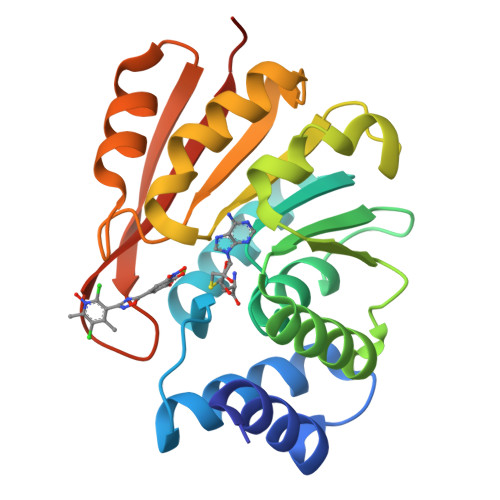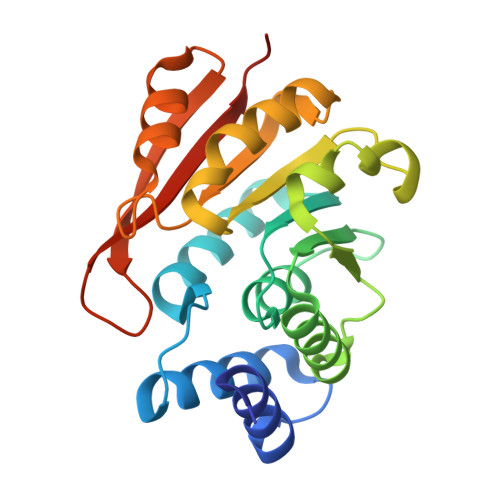Structural and Computational Analyses of the Unique Interactions of Opicapone in the Binding Pocket of Catechol O -Methyltransferase: A Crystallographic Study and Fragment Molecular Orbital Analyses.
Takebe, K., Suzuki, M., Kuwada-Kusunose, T., Shirai, S., Fukuzawa, K., Takamiya, T., Uzawa, N., Iijima, H.(2023) J Chem Inf Model 63: 4468-4476
- PubMed: 37436881
- DOI: https://doi.org/10.1021/acs.jcim.3c00331
- Primary Citation of Related Structures:
7XGI, 7XJB - PubMed Abstract:
A third-generation inhibitor of catechol O -methyltransferase (COMT), opicapone ( 1 ), has the 3-nitrocatechol scaffold as do the second-generation inhibitors such as entacapone ( 2 ) and tolcapone ( 3 ), but only 1 can sustainably inhibit COMT activity making it suitable for a once-daily regimen. These improvements should be attributed to the optimized sidechain moiety (oxidopyridyloxadiazolyl group) of 1 substituted at the 5-position of the 3-nitrocatechol ring. We analyzed the role of the sidechain moiety by solving the crystal structures of COMT/ S -adenosylmethionine (SAM)/Mg/ 1 and COMT/ S -adenosylhomocysteine (SAH)/Mg/ 1 complexes. Fragment molecular orbital (FMO) calculations elucidated that the dispersion interaction between the sidechains of Leu 198 and Met 201 on the β6β7-loop and the oxidopyridine ring of 1 were unique and important in both complexes. In contrast, the catechol binding site made a remarkable difference in the sidechain conformation of Lys 144. The ε-amino group of Lys 144 was outside of the catalytic pocket and was replaced by a water molecule in the COMT/SAH/Mg/ 1 complex. No nitrocatechol inhibitor has ever been reported to make a complex with COMT and SAH. Thus, the conformational change of Lys 144 found in the COMT/SAH/Mg/ 1 complex is the first crystallographic evidence that supports the role of Lys 144 as a catalytic base to take out a proton ion from the reaction site to the outside of the enzyme. The fact that 1 generated a complex with SAH and COMT also suggests that 1 could inhibit COMT twofold, as a typical substrate mimic competitive inhibitor and as a product-inhibition enhancer.
- Oral and Maxillofacial Surgery II, Osaka University Graduate School of Dentistry, Suita, Osaka 565-0871, Japan.
Organizational Affiliation:





















